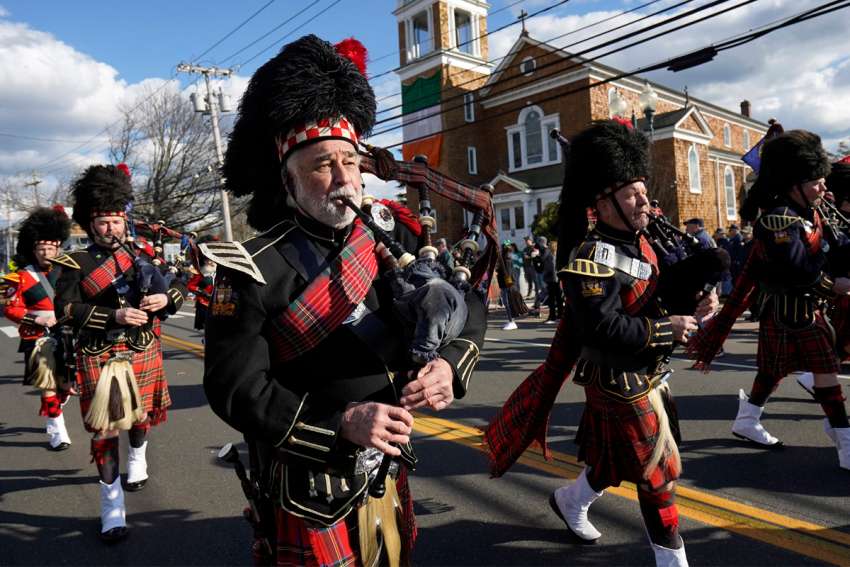But a number of bishops have added some “meat” to those orders by commuting, rather than dispensing with entirely, the obligation — making it conditional upon performing acts of prayer and charity, and giving Catholics something additional to chew on in the process.
The moves, provided for under Canon 87 of the Code of Canon Law, aim to balance the festive nature of the day — an optional memorial in the Church’s Roman Calendar — with the penitential season of Lent, during which Catholics ages 14 to 60 are required to abstain from meat on Fridays.
“It is well known that St. Patrick’s Day is a day of convivial celebration for many American Catholics,” said Cardinal Wilton Gregory of Washington in his Feb. 2 decree, while Bishop David A. Zubik of Pittsburgh pointed to “the great impact which St. Patrick has made not only on the people of Ireland, but especially in our own diocese.”
At the same time, bishops were careful to stress the need to retain a Lenten spirit amid celebrations of St. Patrick. Patricius, a Romanized Britain of the fifth century, was enslaved by Irish raiders for six years, experienced a personal conversion, and then returned to evangelize that land’s pre-Christian peoples with the Gospel. In his “Confessio,” St. Patrick wrote that as a youth he “would pray up to 100 times” a day, “and at night perhaps the same.” The “Apostle of Ireland” laid the groundwork for Christianity to take root among the Irish, countless numbers of whom ultimately brought the Catholic faith to different parts of the globe over the centuries.
For Irish American Catholics, the tradition of eating corned beef and cabbage (or variants of the dish) around St. Patrick’s Day recalls the sufferings of their immigrant ancestors who fled famine, poverty and repression in Ireland under British colonial rule marked by anti-Irish racism and anti-Catholic persecution. The most notable example is the Great Hunger (1845-1852), when British authorities insisted on exporting foodstuffs out of Ireland even as a potato blight wiped out most of the potato crop. A million Irish consequently died of starvation, while another million emigrated to North America shores, swelling the ranks of the Catholic Church.
“The corned beef to me reaches back to our ancestors, the first in our families who came to the U.S. And I think the bishops look at that big picture,” said Daniel O’Connell, president of the Ancient Order of Hibernians, America’s oldest Irish Catholic fraternal organization. “They recognize that Catholics in America are (honouring those) who got starved out of Ireland.”
Archbishop Jerome Listecki of Milwaukee said while “feast day in the Church means what it says ... (and) calls for celebratory feasting,” Catholics observing St. Patrick’s Day “are encouraged to engage in another sacrificial or charitable act that day or give up meat on another day.”
Bishop Kevin Rhoades of Fort Wayne-South Bend, Indiana, was even more specific, declaring faithful in that diocese may substitute the normal abstinence with attending Mass, praying the rosary for world peace or spending half an hour in prayer before the Blessed Sacrament.
Catholics in the Diocese of Cleveland are being asked by Bishop Edward Malesic to “select another non-Friday day during Lent to abstain from eating meat, or to make some offering on behalf of the poor, whether by prayer, fasting or almsgiving in order to recognize and honour our Lord’s mission and passion for the sake of the salvation of souls.”
Bishop Earl Fernandes of Columbus, Ohio gave some of the most detailed conditions for his dispensation, requiring faithful to choose among making a pilgrimage or visit any church in that diocese named in honuor of St. Patrick; assisting at Mass on March 17; praying the “Breastplate of St. Patrick” prayer (attributed to the saint); engaging in a pious devotion such as the rosary, the Stations of the Cross or Eucharistic Adoration; or “(performing) an act of comparable penance,” such as abstaining from meat at some point during the third week of Lent.


